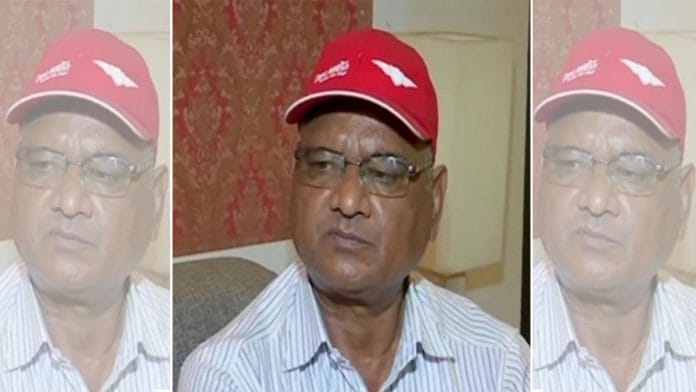New Delhi: Maharashtra-based farm union Shetkari Sanghatana chief Anil Ghanwat has declared his intent to rally at least one lakh farmers in the national capital in a bid to signal support for the three contentious farm laws that are set to be repealed in the wake of massive protests.
Speaking at a press meet in Delhi Tuesday, Ghanwat — one of the members of a panel set up by the Supreme Court to examine the laws — said a show of support for the farm laws is important as the repeal has “set precedent for future governments” to deny reforms in the sector. He also urged the apex court to immediately release the panel’s report, submitted in March, to make farmers aware about the laws’ benefits.
“Within a few months, we will bring at least one lakh farmers to Delhi to support the reforms and organise an event for a day or a week to make our voices heard,” Ghanwat told reporters at the Press Club of India.
“This is really important as the repeal has set precedent for future governments to not bring the much-needed reforms in the agriculture sector… We will prove that there is support for the reforms too,” he added.
Ghanwat said such an event was not conducted earlier “as we didn’t want to create a farmer-vs-farmer scenario in Delhi”.
“However, now we have no option but to protest and make our voices heard. I will also go across the country to inform farmers of their benefit from farm reforms,” he added.
Ghanwat’s comments came four days after Prime Minister Narendra Modi announced that the three laws will be repealed in the upcoming winter session of Parliament. The PM also urged the protesting farmers to return home. The farmers, mainly from Punjab, Haryana and Uttar Pradesh, have been protesting at Delhi’s borders for almost a year, seeking a repeal of the three laws.
Earlier, Ghanwat had told ThePrint that the government’s decision is a “political” gambit to “influence” assembly election outcomes in Uttar Pradesh and Punjab. He had said that PM Modi chose his party interests in UP and Punjab over the farmers’ interests.
Also read: ‘Punjabis don’t forget easily’ — farmers in Punjab cheer repeal but no props for Modi
‘Policy process not consultative’
At the press meet, Ghanwat said he has written to Chief Justice of India N.V. Ramana, urging him to consider releasing the report of the panel as soon as possible, or authorise the panel or him to do so.
“I would like to bring to the notice of the court that, for many decades, India’s farmers, as entrepreneurs in their own right, have suffered from regulation that chokes their production and marketing efforts. Many of India’s farmers are desperate for renewed, not less, focus on reforms particularly market freedom and technology freedom,” Ghanawat wrote in his letter to the CJI Tuesday.
“These laws were accepted in principle by our farmers’ movement, but were not accepted entirely by the farmers because the policy process of the Indian government is not consultative,” he wrote.
The report, the letter states, “can also play an educational role and ease the misapprehensions of many farmers who have, in my opinion, been misguided by some leaders who do not seem to appreciate how a minimally regulated free market can allocate national resources to their most productive use”.
In his media address, Ghanwat lashed out at the apex court for not releasing the committee report in time.
“If the report had been released well in time, it would have avoided the repealing of the laws as timely discussion on the findings and informative recommendations in the committee report would have cleared the misapprehensions surrounding the law which have fueled the protest so far,” Ghanwat said.
“The current agriculture policy has forced farmers to commit suicide and remain poor for decades and it can’t go on like this,” he added.
Speaking about the farmers’ demand for a legal guarantee on minimum support price (MSP), Ghanwat said the MSP regime — which covers water-intensive paddy and wheat — has led to water table decline in Punjab and Haryana, leading to threat of desertification.
Other allied sectors of agriculture, which are the fastest-growing, don’t function under the MSP regime, he said. The money wasted to maintain MSP should be used to promote diversification and sustainable agriculture, he added.
(Edited by Amit Upadhyaya)
Also read: Modi govt’s farm laws misadventure will hurt urbanisation






